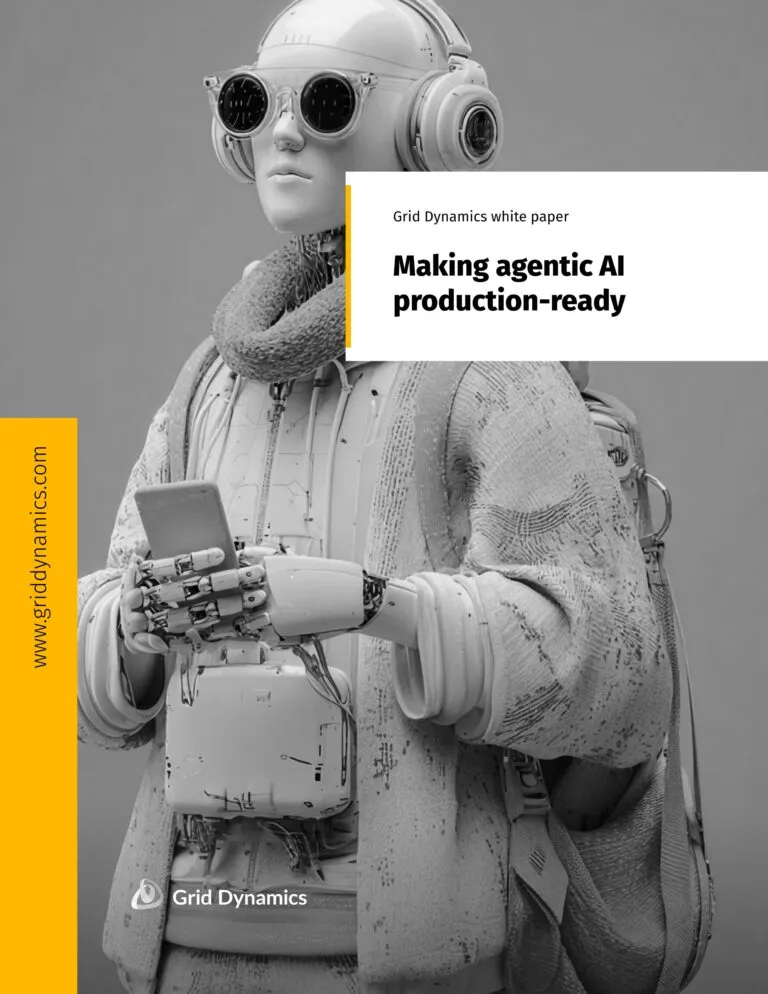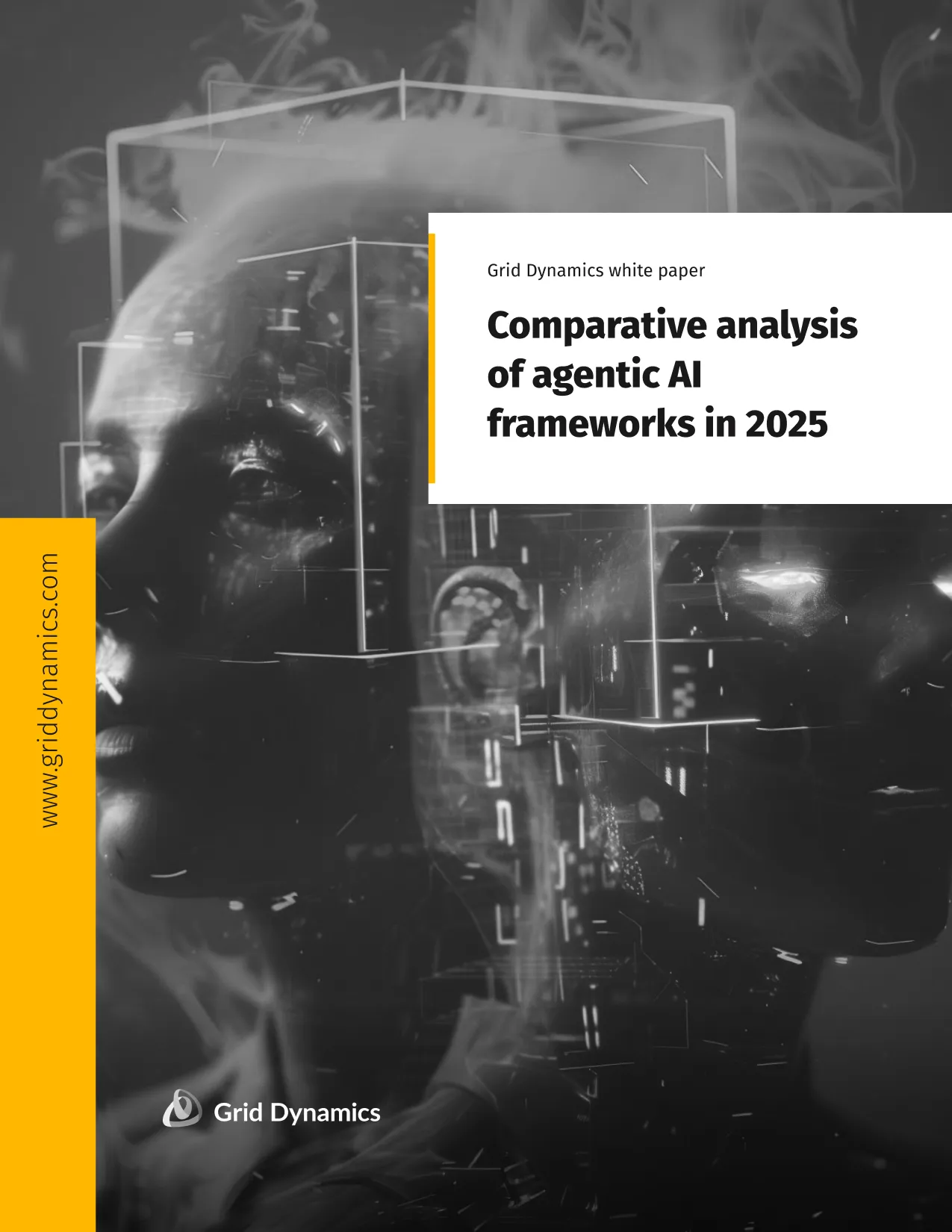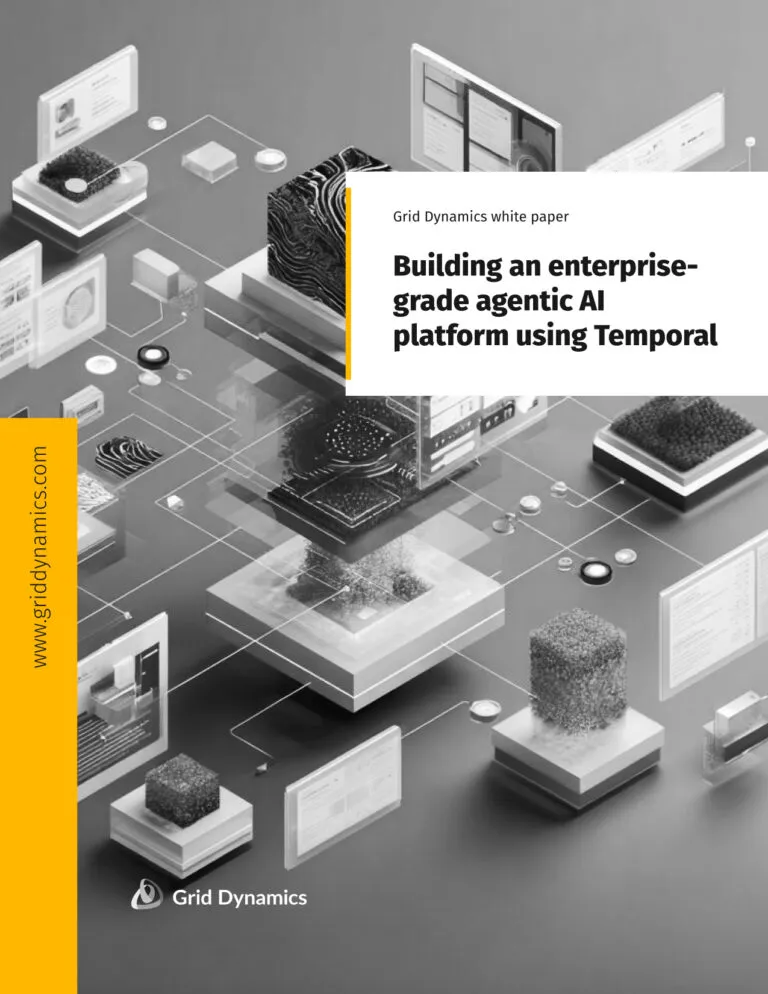Get the White Paper

How AI in quality assurance redefines software quality
Delivering reliable software at speed is challenging. Even more challenging is continuing to rely on traditional quality assurance as digital transformation accelerates. Manual testing and conventional test automation simply can’t keep up with the complexity and pace of modern development. Artificial intelligence is now reshaping the quality assurance process, enabling organizations to move from reactive testing to proactive, data-driven quality management. Download the full white paper to discover how AI in quality assurance is driving measurable improvements in software quality, test coverage, and delivery velocity—and how your team can benefit.
Why is AI in quality assurance so important for modern enterprises?
Manual testing and legacy automation are hindering instead of helping many QA teams today. Why? Because they often result in inconsistent test coverage, slow feedback, and growing costs. AI in quality assurance makes it faster and easier for teams to automate repetitive testing tasks, optimize test suites, and deliver action-ready insights that speed up releases and reduce risk (and costs).
The benefits of integrating artificial intelligence into your QA process helps your teams:
- Automate everyday test case generation and maintenance, making it possible for skilled testers to invest more time in strategic work.
- Improve anomaly detection through machine learning algorithms that analyze application behavior and historical test data.
- Optimize test coverage with AI tools that find gaps and create new test scenarios.
- Reduce human error and manual effort in functional and regression testing.
- Prioritize continuous improvement and agile development productivity through faster, data-driven feedback loops.
Want to see these benefits in action? Download the white paper for technical insights on AI-driven quality assurance strategies, written by CTOs, for CTOs and tech leaders.
Does AI improve testing processes across the software development lifecycle?
Yes, it does. Here’s how:
Generate optimized test cases faster
Natural language processing and machine learning models analyze requirements, user input, and past issues to generate detailed test cases, including edge cases that are often missed by manual testing processes. The benefit to you is broader and more relevant test coverage, and a faster, more reliable QA process.
Automate adaptive self-healing test scripts
Is your QA team wasting time (and dollars) on constant application maintenance? AI-powered test automation tools now deliver self-healing scripts that adapt to changes in the user interface or API endpoints. This means less time spent updating test scripts and more time focused on high-value testing efforts.
Make test data generation safer with predictive analytics
Realistic test data can be hard to come by, but it is critical for effective software quality assurance. AI technologies can synthesize test data that matches actual, real-world scenarios to support functional testing and performance testing. Machine-learning-powered predictive analytics prioritize test execution based on analyzing risk through code changes and historical anomalies.
Ensure more agile failure analysis and defect categorization
When tests fail, pinpointing the root cause can take time—which you likely don’t have enough of. AI tools use log analysis and NLP to group similar failures, find and suggest likely root causes, and provide understandable summaries of what’s wrong, where, and how. The results? Much more efficient triage so QA teams can focus on fixing the most important issues quickly.
Leverage agentic AI for autonomous testing
The latest buzz around AI in quality assurance is autonomous testing. Beyond the hype, Agentic AI systems, like human testers, are capable of exploring mobile and web applications to generate and execute test scenarios, and find unexpected bugs and usability issues.
The business impact is clear: Faster releases, better quality, lower costs
When you adopt AI-driven quality assurance you will see the value in compelling numbers:
- 15–30% shorter release cycles, thanks to automated test case generation and ultra-fast feedback.
- Up to 50% fewer production defects, as a result of broader and better test coverage and anomaly detection.
- Lower QA costs, because automated testing and self-healing scripts reduce manual effort and constant maintenance.

In turn, QA teams can shift their focus to exploratory testing, strategic quality management, and business value rather than time-consuming repetitive tasks.
Download the white paper to see the data and case studies.
Implementation strategies from CTOs for AI-powered QA
A strategic, step-by-step approach to integrating AI into your quality assurance automation process is fundamental. Our CTO office offers the following advice:
- Audit your existing QA process to identify areas where AI can deliver the most value.
- Run pilot AI tools for the use cases you identified. We suggest test case generation, test data creation, or automated failure analysis.
- Perhaps most importantly, invest in data modernization for AI. This means strong data foundations for access to high-quality, representative test data. Without it, effective machine learning model output accuracy is tarnished.
- Choose AI test automation tools that are compatible with your technology stack. Integrate them into your DevOps and agile development workflows.
- Monitor AI performance, retrain models, and ensure that human testers are collaborating with AI systems for continuous improvement.
- Keep checks and balances between automation and human oversight, especially when it comes to exploratory and usability testing.
The white paper provides a detailed roadmap for implementing AI in quality assurance, including tool recommendations and best practices for change management.
Busting myths about AI in quality assurance
Fear not: AI will not replace human testers. While AI is great at automating repetitive testing tasks and generating test cases, human intuition and creativity cannot be replaced for exploratory testing, usability assessments, and complex scenario analysis.
Be careful: AI testing tools are not infallible. Their accuracy depends on the quality of training data and ongoing human validation.
Take note: AI is not a fix-all silver bullet. Successful implementation requires thoughtful tech planning, data preparation, and continuous monitoring.
Remember: Not all testing types are a good fit for AI, and vice versa. AI might excel at regression testing, test case generation, and visual testing, but human expertise is still necessary for acceptance testing and complex end-to-end scenarios.
Risks and best practices for AI-driven quality assurance
One of the biggest barriers to AI adoption today is the fear of associated risks. And while AI in quality assurance does introduce new risks, like data quality, privacy, security, and explainability issues, there are multiple tactics to effectively manage these risks. In a nutshell, you need to:
- Ensure data privacy and remain compliant with relevant regulations.
- Use explainable AI techniques for transparency and trust.
- Establish secure MLOps practices for continuous monitoring and retraining of machine learning models.
- Keep humans in the loop to ensure that AI outputs are validated and continuously improved.
The white paper offers in-depth and practical guidance for developers to build better, faster AI-powered QA processes while mitigating risks.
What’s the next new for AI in quality assurance?
As things stand right now, you can soon expect to see:
- Even more advanced generative AI models for faster test case creation and scripts.
- Fully autonomous self-healing scripts that adapt proactively to changes in applications.
- Broader AI integration across the DevOps pipeline for continuous testing and feedback.
- AI-powered non-functional testing, including load testing, performance testing, and security testing.
- Multi-AI agents collaborating to optimize testing processes and maximize test coverage.
Get the full white paper for:
- Technical considerations and advice on artificial intelligence, machine learning, and natural language processing in software testing.
- Tested and true implementation strategies and case studies.
- Practical recommendations designed for developers to integrate AI into the quality assurance process.
- A review of leading AI-powered QA tools and their impact on software quality.
Time to transform your QA process and accelerate software quality? Yes, it is.
Tags
You might also like
Most enterprises are already betting big on AI… but very few have turned it into a reliable, industrial‑grade software factory. On the backend, most engineering leaders know they need AI SDLC, but few know how to measure whether they’re actually doing it well. Download the white paper to run a...
Choosing the right agentic AI framework matters. Crew AI, Google ADK, LangGraph, and OpenAI Agents SDK each solve different problems, from rapid multi-agent prototyping to durable, stateful workflows and cloud-native enterprise agentic AI deployments. This comprehensive white paper examine...
As an enterprise leader, you’ve likely seen countless AI prototype demos over the last few years promising empty buzzwords like “transformation”, “efficiency”, and “competitive edge”. But how many of those prototypes actually work in production? Over the past decade, multiple AI hype cycles ha...
Running agent-based systems across your enterprise comes with tough problems. The main ones are keeping costs down, scaling up fast, and making sure nothing breaks when things go wrong. This white paper gets into the real challenges that come up when teams move from simple agent pilots to a ful...

Download this white paper for comprehensive details on how large-scale applications can overcome web application security risks and evolving web threats, including AI-driven attacks, supply chain vulnerabilities, and compliance pitfalls. It goes beyond traditional checklists for web applicati...
From performance and portability to real-world limitations, this white paper explores how WebAssembly (Wasm) is modernizing web development and its growing role in handling AI. Download the full WebAssembly white paper if you’re a frontend and full-stack developer, CTO or technical lead, D...
From retail to manufacturing, and from financial services to healthcare, every industry is eager to capitalize on the potential of artificial intelligence. But AI-ready data is essential to realizing that promise. To truly unlock that potential, AI solutions for enterprises must be built on a fou...










